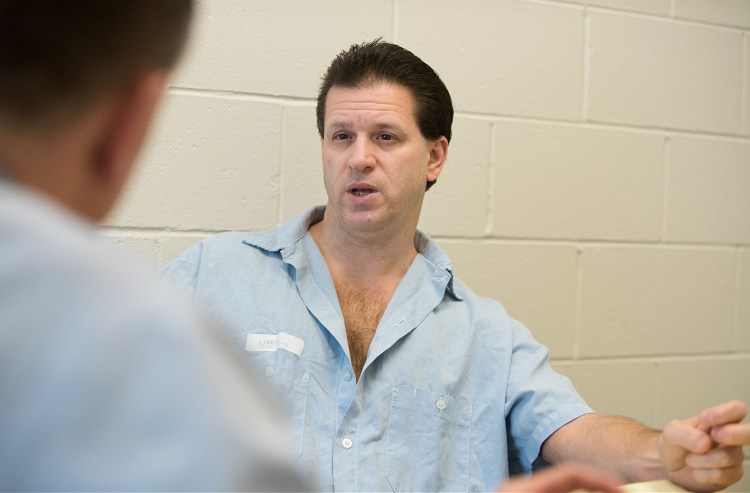Reversing a policy that was challenged on constitutional grounds, the Department of Corrections will no longer ban inmates from submitting their writing to the news media for publication under a byline, according to an attorney who represents an inmate at the Maine State Prison.
Attorney Peter DeTroy, whose client had been threatened with discipline if he wrote for the media again, said Thursday that the department’s lawyer told him the policy reversal will go into effect no later than Monday.
“Basically, if someone wants to write a letter, an opinion, or byline or whatever, there is no longer a prohibition on doing that,” DeTroy said. “I don’t think the policy meets constitutional scrutiny.”
Jody Breton, deputy commissioner of the Department of Corrections, said in an email Thursday morning that the department would soon issue a statement announcing the changes to its inmate discipline policy. The department hadn’t released any details by late Thursday afternoon.
DeTroy represents inmate Jeffrey Libby, a convicted murderer serving a 60-year sentence for drowning his grandfather in 1986. Libby, 52, began writing newspaper opinion pieces in 2007 advocating for prison reform, such as pushing to reinstate parole or championing inmate literacy programs.
After Libby’s most recent op-ed piece was published in the Portland Press Herald on Oct. 5, he was ordered by prison officials to “cease and desist” or face discipline – solitary confinement or loss of credit off his sentence for good behavior. Libby enlisted DeTroy’s help after unsuccessfully challenging the prison’s “cease and desist” order through an internal grievance process.
A TEST CASE
The department’s focus on Libby’s writing came as it considered adopting a new set of inmate discipline rules that included the prohibition on prisoners writing material for use in the news media. Constitutional lawyers warned the rule would make Maine’s policy on prisoner communications one of the most restrictive in the nation.
Libby’s writing became a test case.
“I was glad to be an instrumental part of what was going on,” Libby said in a phone call from prison Thursday afternoon.
During a recent interview at the prison, Libby said that he started writing opinion pieces after serving the first 20 years of his sentence, mostly because he wanted the public to know that most prisoners can be rehabilitated.
Libby said the primary reason inmates should be allowed to write is to maintain a connection with the outside. Most inmates eventually will be released to society and have a better chance of rehabilitation if they remain connected.
“I’ll tell you, I’m looking forward to submitting my next op-ed piece,” he said in Thursday’s phone call.
Libby was unsure whether his next piece will be about his own experience after being told to “cease and desist” or about chronic shortages in prison guard staffing, or whether he will return to advocating for reinstating parole.
“A paradigm shift is needed to bring about change within the system. We have a very archaic prison system that has a penal philosophy instead of a reform philosophy,” he said.
The specific policy DeTroy had challenged related to inmate contact with the news media. It prohibited inmates from “acting as a reporter, publishing under a byline, or blogging, directly or indirectly, hosting or being a guest on a broadcast, or acting as an agent of the news media.”
The proposed rule meant the Department of Corrections could potentially silence inmates without consequence. Prisoner advocates said that would leave the public in the dark about prisoner abuse and increase the likelihood that inhumane conditions would go unreported.
DeTroy said he had a couple of conversations with Assistant Attorney General Diane Sleek, who serves as legal counsel for the Department of Corrections, about the legality of the policy and had told her that he would file a lawsuit if necessary. But he said Sleek told him this week that she was advising the department to rescind the policy, making the lawsuit unnecessary.
“It looks like it may have mooted the issue,” DeTroy said.
OPPOSITION TO PROPOSALS
The policy on writing was just one of many proposed inmate discipline policies under review by the Department of Corrections.
The proposals mostly seek to amend existing policy for adult and juvenile inmates related to commonly prohibited acts such as destruction of property, fighting, displaying gang symbols and possessing contraband.
But they also include policies that either have been rejected by courts or haven’t been tried in other states, such as bans on interacting with the news media, soliciting or communicating with a pen pal, passing or receiving written communication without authorization, and social networking.
The department held a public hearing in October on the proposals at its headquarters in Augusta, and every speaker there expressed opposition to the proposed rules.
It is unclear whether the department has finalized those rules changes, or whether the Attorney General’s Office is still reviewing them.
A spokesman for the Attorney General’s Office deferred comment on inmate discipline policies to the Department of Corrections.
Scott Dolan can be contacted at 791-6304 or at:
Twitter: scottddolan
Send questions/comments to the editors.



Success. Please wait for the page to reload. If the page does not reload within 5 seconds, please refresh the page.
Enter your email and password to access comments.
Hi, to comment on stories you must . This profile is in addition to your subscription and website login.
Already have a commenting profile? .
Invalid username/password.
Please check your email to confirm and complete your registration.
Only subscribers are eligible to post comments. Please subscribe or login first for digital access. Here’s why.
Use the form below to reset your password. When you've submitted your account email, we will send an email with a reset code.